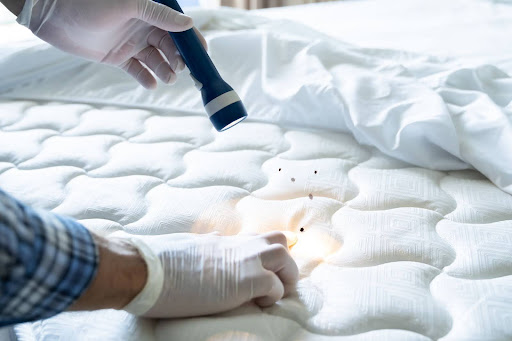Just when you thought it was safe to snuggle into your sheets, bed bugs strike.
This might sound like a horror movie tagline, but for many Oregonians, it’s a terrifying reality. Bed bug infestations are on the rise nationwide, and not just on the West Coast.
From Portland’s bustling urban landscape to the serene countryside, if you’re worried about bed bugs, Oregon is sadly no exception.
The Oregon Bed Bug Boom
You may wonder why bed bugs are so prevalent in Oregon.
It’s no different than anywhere else, with increased travel and urbanization making it easier for tiny hitchhikers to spread. More people are moving around and living in close quarters than ever before.
Portland, Eugene, and other cities in Oregon have seen significant growth over the past decade. There are more apartment buildings, shared living spaces, and public transportation—all of which are prime opportunities for bed bugs to hitch a ride and find new homes.
Oregon’s allure as a travel destination brings a steady stream of visitors from around the world. Bed bugs are known stowaways, traveling in luggage and clothing. Increased travel means more opportunities for these pests to infiltrate homes and businesses.
The Pacific Northwest’s temperate climate is also to blame. Bed bugs thrive in temperatures between 70°F and 80°F, which is common in many Oregon cities.
What Exactly Are Bed Bugs?
Bed bugs, scientifically known as Cimex lectularius, are small, nocturnal insects that feed on the blood of humans and animals. They are reddish-brown, flat, and oval-shaped, measuring about 4-5 millimeters in length.
Despite their insignificance in size, their presence can cause significant discomfort and anxiety. Bed bugs are often mistaken for other household pests. However, they’re unique because they have a tendency to hide in cracks and crevices, making them tough to detect.
Common hiding spots include mattress seams, box springs, bed frames, and even behind wallpapers or picture frames. Unlike other parasitic insects, bed bugs are not known to transmit diseases; however, their bites can result in itchy red welts and allergic reactions.
The psychological toll of a bed bug infestation can also be considerable, leading to sleep disturbances and stress.
Signs You Have Bed Bugs
Before you can tackle a bed bug infestation, you need to know what to look for. Bed bugs are sneaky and good at hiding, but they leave behind telltale signs.
One of the most obvious signs of bed bugs is small, red bites on your skin. These bites are often itchy and appear in clusters or lines. Bed bugs typically bite exposed skin while you sleep, so check your arms, legs, and neck for any suspicious marks.
Bed bugs also leave behind excrement that can appear as rusty or dark stains on your sheets, mattress, and furniture. These stains are usually small and resemble tiny ink spots.
Finally, a musty odor in your bedroom or living space can indicate a bed bug infestation. Bed bugs release pheromones, which produce a distinctive, unpleasant smell. If your room smells off, especially around your bed, it could be a sign of bed bugs.
Practical Tips for Preventing Bed Bugs
Prevention is always better than cure, especially when it comes to bed bugs:
Rethink Second-Hand Furniture
Who doesn’t love thrifting and garage sales? It’s a great way to find hidden treasures, but unfortunately, it’s also a good way to bring bed bugs home unwittingly.
Before bringing any used items inside, thoroughly inspect them for signs of bed bugs. Pay special attention to seams, folds, and crevices where these pests like to hide.
Be Cautious When Traveling
When traveling, take precautions to avoid bringing bed bugs home with you. Inspect hotel rooms for signs of bed bugs before unpacking.
Keep your luggage off the floor and bed, and use luggage racks if available. When you return home, wash and dry your clothes on high heat to kill any potential hitchhikers.
Declutter Your Home
Bed bugs thrive in cluttered environments where they can easily hide. Decluttering, particularly in living rooms and bedrooms, is key.
Regularly vacuum your floors, upholstery, and mattress to remove any potential bed bugs and their eggs.
Why Professional Treatment is Crucial
While DIY methods can help prevent bed bugs, they are often insufficient for dealing with an infestation.
Professional pest control companies have the expertise and experience to effectively deal with bed bugs.
Professionals use advanced treatment methods that are not available to the general public. These methods include heat treatments, which involve heating your home to a temperature that kills bed bugs and their eggs.
Chemical treatments are also effective. However, they must be applied carefully by licensed professionals who know how to use them to avoid health risks and make sure they’re successful.
Professional pest control services don’t just eliminate the current infestation; they also provide ongoing monitoring and prevention for peace of mind.
Banish Bed Bugs in Oregon with Natura Pest Control
Dealing with bed bugs in Oregon is a challenge, but it’s not one you have to face alone.
Don’t wait until the infestation gets out of hand—take action today.
If you suspect you have a bed bug problem or want to ensure your home stays bed bug-free, contact Natura Pest Control in the Vancouver-Portland Metro area.



